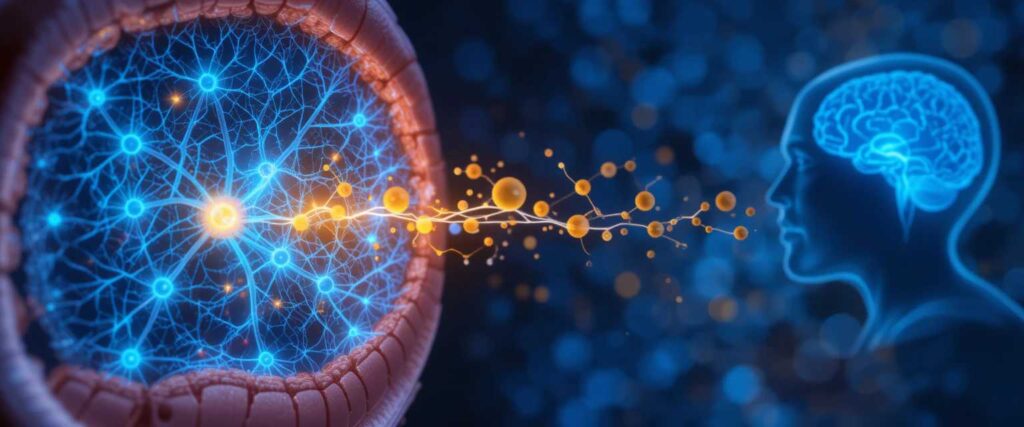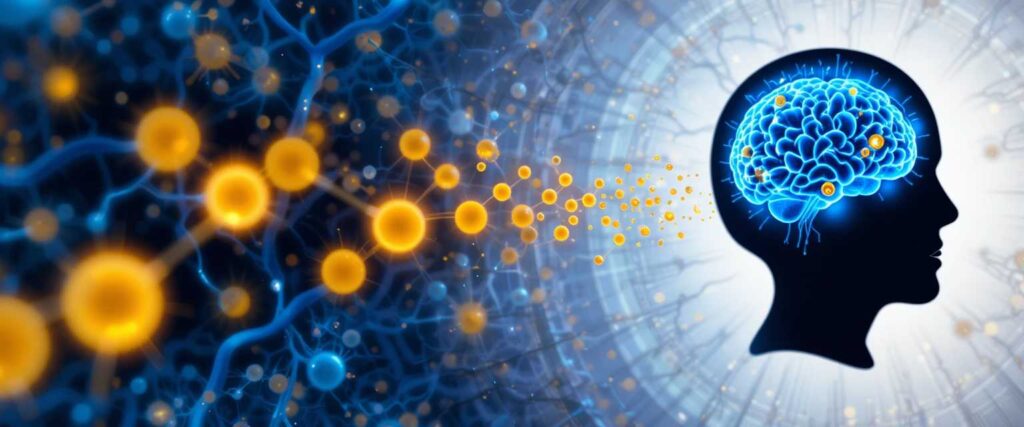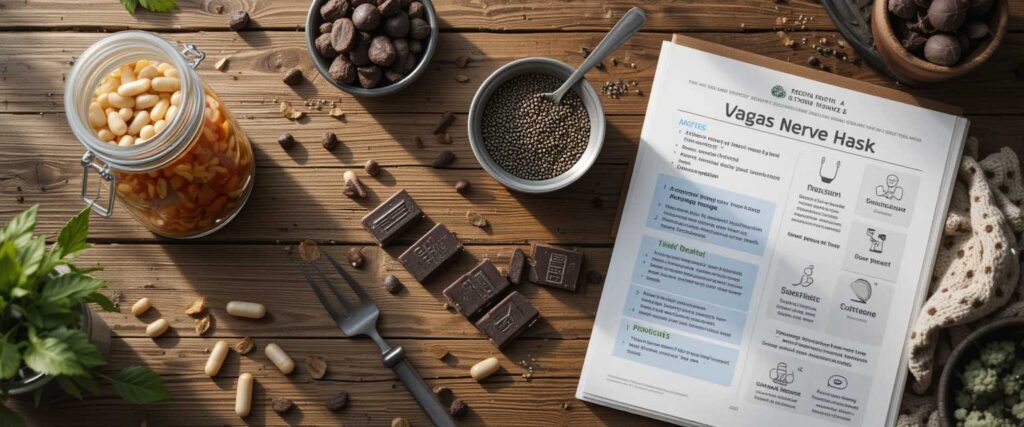Introduction
Ever notice how your stomach churns during a stressful Zoom call or how a week of fast food leaves you feeling jittery and unfocused? It’s not a coincidence—it’s biology. Cutting-edge research reveals that your gut isn’t just digesting lunch; it’s playing DJ with your emotions. Scientists call this the gut-brain connection, and it’s flipping everything we thought we knew about anxiety upside down. Forget “it’s all in your head”—your belly might be pulling the strings. Let’s unpack how healing your gut could quiet your mind, with real-world fixes you can start today.
What if your gut and anxiety are secretly in constant conversation—and healing this connection could be your shortcut to lasting calm?
Table of Contents
Your Gut: The Anxiety Control Center You Never Knew You Had

Your gut is home to 100 million neurons—more than your spinal cord. This “second brain” doesn’t write poetry or solve algebra, but it does produce 90% of your serotonin (the “calm and happy” hormone). When your gut microbiome gets out of whack—thanks to pizza binges, all-nighters, or that third coffee—it doesn’t just cause bloating. It floods your brain with stress signals that can leave you feeling like you’re stuck in fight-or-flight mode.
Here’s the kicker:
- People with IBS are 3x more likely to have anxiety than those with healthy guts.
- A 2023 study found that probiotics reduced anxiety symptoms by 45% in 8 weeks—no prescription needed.
How Your Gut Talks to Your Brain (And Why It’s Gossiping About Your Stress)

The gut-brain axis isn’t some mystical concept—it’s a physical hotline made of nerves, hormones, and bacteria byproducts. Here’s how the convo goes down:
1. The Vagus Nerve: Your Body’s Wi-Fi Router
This longest nerve in your body runs from your brainstem to your colon. When your gut is inflamed (say, from gluten or stress), it sends error messages to your brain, triggering anxiety. But when you’re relaxed? It broadcasts calm vibes downward, soothing digestion.
Hack it: Humming or singing activates the vagus nerve. Try it during traffic jams!
2. Microbial Mail: Bacteria Texting Your Amygdala
Gut microbes make neurotransmitters like GABA (nature’s Xanax) and dopamine. But when bad bacteria overgrow (looking at you, sugar!), they pump out toxins that can:
- Weaken your gut lining (“leaky gut”)
- Let inflammatory molecules into your bloodstream
- Trigger brain fog and panic attacks
Red flags: If your anxiety spikes after meals or you’re constantly tired, your microbes might be screaming for help.
3. Inflammation: The Silent Anxiety Amplifier
A leaky gut doesn’t just hurt—it floods your body with CRP and cytokines, inflammatory markers linked to depression and OCD. Think of it like a fire alarm that won’t turn off.
5 Real-Life Signs Your Gut Is Fueling Your Anxiety

- “Nervous stomach” syndrome: Diarrhea before big events or nausea when stressed.
- Food-mood rollercoaster: Feeling wired after sugar, then crashing into anxiety.
- Skin issues + anxiety: Acne, eczema, or rosacea often pair with gut imbalances.
- Vitamin deficiencies: Low B12, iron, or magnesium (common with gut issues) worsen anxiety.
- Antibiotic aftermath: Did anxiety spike after a round of meds? They nuked your good bacteria.
Your Gut-Healing Toolkit: Science-Backed Fixes for Anxiety

Fix 1: The 3-Day Gut Reset (No Juicing Required)
- Morning: Warm lemon water + 1 tbsp chia seeds (fiber feeds good bacteria).
- Lunch: Spinach salad with grilled chicken, sauerkraut, and olive oil.
- Snack: Almonds + dark chocolate (85% cocoa fights cortisol).
- Dinner: Salmon + asparagus (rich in anxiety-zapping folate).
Why it works: Ditching processed foods starves bad bacteria while nourishing your microbiome.
Fix 2: The Anxiety-Soothing Supplement Stack
- L-theanine: Found in green tea, it boosts GABA without drowsiness.
- Zinc Carnosine: Repairs leaky gut lining (study: reduced anxiety in 68% of users).
- Saccharomyces Boulardii: A probiotic yeast that crowds out anxiety-triggering microbes.
Fix 3: “Vagus Push-Ups” for Instant Calm
Try this when anxiety hits:
- Breathe in for 4 seconds.
- Hold for 7 seconds.
- Exhale for 8 seconds.
- Repeat 4x.
Science says: This resets your vagus nerve, dropping heart rate within 90 seconds.
FAQS
Q1: “Can anxiety cause acid reflux?”
A: Absolutely. Stress tightens your stomach muscles, pushing acid upward. Try licorice root tea instead of PPIs.
Q2: “Why do I feel anxious when hungry?”
A: Low blood sugar triggers cortisol spikes. Snack on nuts or hard-boiled eggs between meals.
Q3: “Do antidepressants harm gut health?”
A: Some SSRIs slow digestion. Pair them with probiotics (ask your doc first).
Q4: “Best probiotic for anxiety?”
A: Look for Lactobacillus helveticus and Bifidobacterium infantis—studies show they lower cortisol.
Q5: “How to heal gut after alcohol?”
A: NAC supplements + bone broth for 3 days repair alcohol-induced leaky gut.
Q6: “Can gut health cause OCD?”
A: New research links strep overgrowth in the gut to OCD flare-ups. A stool test can help.
Q7: “Is oatmeal good for anxiety?”
A: Yes! Its fiber feeds butyrate-producing bacteria that calm inflammation.
The 90-Day Gut-Anxiety Makeover: What to Expect
- Week 1-2: Less bloating, fewer sugar cravings.
- Week 3-4: Deeper sleep, morning anxiety lifts.
- Month 2: Brain fog fades, focus sharpens.
- Month 3: Stress feels manageable; gut issues? What gut issues?
Pro tip: Track progress with a “gut-mood journal”—note meals, stress levels, and anxiety spikes.
When to Call a Pro (Not Just Google)
See a functional medicine doctor if:
- Anxiety persists after 3 months of gut healing.
- You have extreme food reactions (could be SIBO or parasites).
- Fatigue pairs with anxiety (may indicate histamine intolerance).
Conclusion: Your Gut Is the Friend That’s Been Waiting to Help
Anxiety isn’t a life sentence—it’s often a gut screaming for help. By swapping processed meals for probiotic-rich foods, hacking your vagus nerve, and ditching the belief that mental health is “all in your head,” you’re not just healing your belly. You’re reclaiming peace from the inside out. Start tonight: Trade Netflix scrolling for 10 minutes of belly breathing, and let your gut-brain duo finally chill.
Top 10 Googled FAQs About Gut Health and Anxiety
1. “Can stress permanently damage my gut?”
Answer: Stress won’t “break” your gut forever, but chronic stress weakens your gut lining like sandpaper on wood. This can lead to leaky gut, inflammation, and anxiety loops. The fix? Daily 10-minute “vagus nerve workouts” (like humming or deep breathing) to calm both mind and gut. [Internal link: Check out our “5-Minute Stress Resets” on anxieto.com.]
2. “How long until my anxiety improves if I fix my gut?”
Answer: Most people see mood shifts in 3-6 weeks, but full healing takes 90 days. Why? It takes time for new gut bacteria to colonize and repair damaged tissue. Track progress with a “gut-mood journal” (note meals, stress, and anxiety spikes).
3. “Can I heal my gut without giving up coffee?”
Answer: Yes—but timing matters. Drink coffee after breakfast, not on an empty stomach. Add collagen powder to protect your gut lining. If anxiety flares, switch to green tea (it has L-theanine, which balances caffeine’s jitters).
4. “Why does my anxiety get worse at night?”
Answer: Your gut produces melatonin (the sleep hormone). If your microbiome is off, melatonin production drops, leaving you with racing thoughts at 2 AM. Try a bedtime snack: almond butter + banana (rich in magnesium and tryptophan).
5. “Do gut issues cause social anxiety?”
Answer: Surprisingly, yes. Gut inflammation triggers shyness by overactivating the amygdala (your brain’s fear center). A 2023 study found that 62% of socially anxious patients improved with probiotic therapy. [External link: Nature Mental Health study on probiotics and social behavior.]
6. “Is yogurt enough for good gut health?”
Answer: Most store-bought yogurts are sugar bombs that feed bad bacteria. Opt for unsweetened Greek yogurt + fresh berries. For bigger fixes, try kimchi or kefir—they have 10x more strains than typical yogurt.
7. “Can gut health affect ADHD?”
Answer: Emerging research links ADHD to low levels of Bifidobacterium. These bacteria produce GABA, which helps focus. Parents report fewer hyperactivity symptoms after kids cut artificial dyes and take kid-safe probiotics. [Internal link: Read “Diet Hacks for ADHD” on anxieto.com.]
8. “Why do I crave sugar when anxious?”
Answer: Bad gut bacteria love sugar and hijack your cravings to survive. Outsmart them with bittersweet dark chocolate (85% cocoa) or cinnamon-spiced almonds. Within days, cravings fade as good bacteria regain control.
9. “Does intermittent fasting help gut anxiety?”
Answer: For some, yes—fasting gives your gut a break from constant digestion. But if you have a history of disordered eating, it can backfire. Start with 12-hour overnight fasts and hydrate with lemon-ginger water.
10. “Can antibiotics cause long-term anxiety?”
Answer: Antibiotics nuke both bad and good bacteria. Many report anxiety spikes post-treatment. Rebuild your microbiome with Saccharomyces Boulardii (a probiotic yeast) and bone broth. Avoid repeat antibiotic cycles unless absolutely necessary

Pingback: Feeling Anxious for No Reason? 15 Hidden Causes (and Fixes) That Actually Make Sense | Anxieto